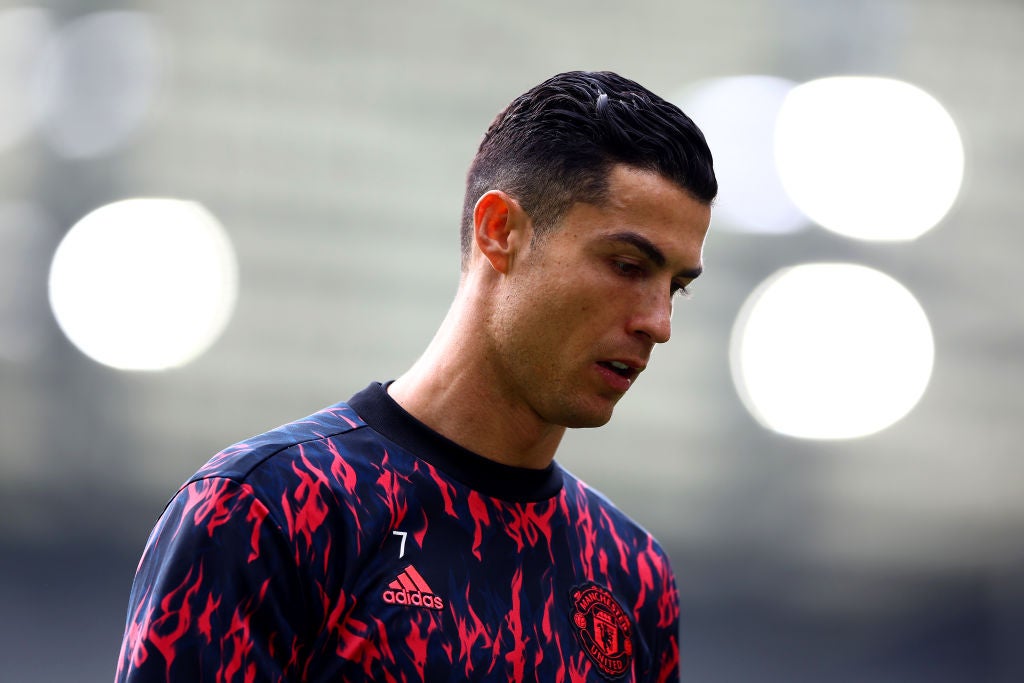Cristiano Ronaldo’s return to Manchester United has failed on almost every level
Social media numbers aside, everyone has suffered from Ronaldo’s return to Old Trafford

Cristiano Ronaldo played for Manchester United in 2003 and he may yet play for them in 2023. The Erik ten Hag era began without United’s most famous player but with the new manager declaring he was “not for sale”. Ronaldo’s apparent wanderlust means that, if he gets his way, his reunion with United will be cut short. Rather than returning them to past glories, it has cast him into uncharted territory. Stay and the Champions League’s record goalscorer will be playing in the Europa League. It would be a sign of how the mighty has fallen.
It would also be an indication of his return having backfired. Because, ultimately, everyone has suffered. Even Ronaldo, though his bank balance was boosted still further by the sort of salary that makes him unaffordable to most others. While he won the Sir Matt Busby award again and was shortlisted for PFA Player of the Year, and while his return of 18 league goals was exceptional for a 37-year-old, it was still his lowest tally for 13 years. He has slipped off the pedestal of the world’s best. He had the joyous homecoming against Newcastle and the tour de force of his hat-trick against Tottenham, but untold indignities against Liverpool and Manchester City.
More broadly, United went from second to sixth, from 73 goals and 74 points to 57 and 58 respectively. The idea Ronaldo would bring the best from the other attack-minded players, that he would spur them on to improvement, was disproved. Jadon Sancho had a difficult debut year. Each of Marcus Rashford, Mason Greenwood, Anthony Martial, Edinson Cavani and Bruno Fernandes scored fewer goals than in 2020-21. Meanwhile, Ten Hag got a glimpse of untapped potential and life without Ronaldo when Sancho and Martial scored and Rashford looked livelier in Tuesday’s 4-0 win over Liverpool.
Yet Ronaldo was far from the sole cause, as Rashford had the worst season of his life last year. He is not the reason Greenwood’s campaign was curtailed early but, before the Portuguese joined, it started with three goals in as many games and the sense he could emerge as United’s premier striker, before that role was plucked from him. Cavani’s absences became ever longer, his commitment ever more questionable, but after United asked him to stay, he lost his status and his shirt number to a still older forward, as well as a year of his career.
“Agent Bruno”, one of those to persuade Ronaldo to return, lost some of his powers and his potency in his compatriot’s shadow. Both endured goal droughts: perhaps it was no coincidence that two of Fernandes’ rare penalty misses came with the added pressure that Ronaldo was on the pitch. Martial, like Jesse Lingard, became a spare part. Magnificently, despite possessing so many potential strikers in autumn, United contrived to start a Manchester derby with Paul Pogba and Fernandes as twin false nines while Ralf Rangnick bemoaned a lack of forwards.
Not that United’s various leaders endured any lasting benefit from Ronaldo’s comeback either. If Ed Woodward and the Glazers hoped it would restore their popularity after signing up for the Super League – or a host of other things – any uplift proved temporary. Woodward is gone; protests calling for the Glazers to do likewise have become common.
Nor did United’s figurehead on the pitch fare much better. Harry Maguire endured the most traumatic campaign of his career, losing form and authority, seemingly undermined by the Ronaldo faction. Ten Hag confirmed the centre-back as captain again, which could set the tone for another divided dressing room if a man with designs on the armband stays.

Meanwhile, whereas Ronaldo had one manager for his first six seasons at Old Trafford, now he is on the third of his second coming. Rewind a year and Ole Gunnar Solskjaer’s reign could be deemed a qualified success: he was not a world-class manager but he had lifted them to second, counter-attacking tactics had produced a series of wins against the elite and he had rebooted United, focusing on youth, improving a number of players and apparently producing a happier dressing room after Jose Mourinho’s fractious tenure. Instead, Solskjaer’s final 10 weeks were so hideously bad that all notions of progress seemed destroyed. The foundations he felt he was laying seemed built on sand. And if, again, that was not all Ronaldo’s fault, he altered the dynamic.
Then Ralf Rangnick’s interim spell in charge was doomed from the start. The combination of the godfather of gegenpressing and the most static of strikers was a predictable mismatch. Rangnick could neither play with Ronaldo nor without him. His team were incoherent and ineffective. Ronaldo scored as many league goals for Rangnick as Fernandes, Rashford, Sancho, Pogba, Cavani, Greenwood and Martial mustered between them. The German still concluded United needed a younger striker. He presented his recommendations for how the squad should be reshaped to the board. The chances are they included parting with Ronaldo.
And yet, when the forward reached the same conclusions for very different reasons, United appear intent on keeping him. Perhaps the sense of rejection would be too great for them to accept it. Yet if a year together worked for anyone, it may have been United’s commercial and social media teams. In other respects, everyone has felt like a loser from the serial winner’s return.



Join our commenting forum
Join thought-provoking conversations, follow other Independent readers and see their replies
Comments